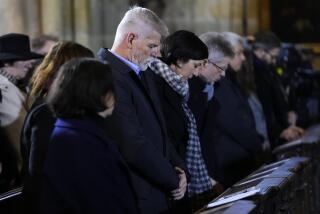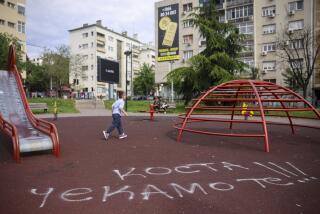Serbs Terrified by 3 Killings at University
- Share via
PRISTINA, Yugoslavia — The final steps of the three Serbs took them down a gray marble staircase in Pristina University’s new economics building, where each--bound and gagged--was shot in the head.
The men’s bodies were discovered Thursday morning on the floor of the women’s bathroom in the basement. The key to the room was in the lock, as if one of the victims--a security guard--had opened the door himself.
A set of car keys was in the bathroom sink, leaving terrified faculty members to conclude that the motive in the slayings of the guard, a professor and a cafeteria worker was not theft.
Like many of Kosovo’s institutions, Pristina University threw out most of its ethnic Albanian workers in the early 1990s. So its new economics building may represent an irresistible prize of victory over the Serbs--and its staff an inviting target of revenge.
British military police had no suspects in the Wednesday night slayings, but Serbs had no doubt that the killers were ethnic Albanians.
“This is revenge,” a Serbian faculty member said after stepping out of the small room where the three bodies lay in coagulating pools of their own blood. “Nothing has been stolen, so this was not a robbery.”
The man spoke on condition that he not be named because, like most Serbs who have resisted the urge to flee Kosovo, he is afraid of becoming the next victim as ethnic Albanians seek revenge for past Serbian atrocities.
Education is a deadly serious matter in Kosovo, a province of Yugoslavia’s main republic, Serbia. The ethnic Albanian majority says Yugoslav President Slobodan Milosevic replaced a multiethnic educational system with a form of cultural apartheid.
Economics professor Milenko Lekovic, cafeteria worker Jovica Stamenkovic and guard Miodrag Mladenovic may have paid for Milosevic’s policies with their lives.
The professor’s body lay in the middle, his hands tied behind his back with a leather lace. He was gagged with several strips of packing tape wrapped around his head, too tight for him to scream.
Stamenkovic was slumped in the corner of the small room. He had a bullet in the left side of his forehead and his hands tied behind his back.
The Killers ‘Are Trying to Scare Us’
Beside the professor’s corpse lay the body of Mladenovic, his mouth gagged with a burgundy red necktie. Another tie bound his hands behind his back.
Nearby, a small hammer lay inches away from the professor’s wire-rimmed glasses, which landed lenses down on the floor, spattered with blood.
The killers “are trying to scare us and they are working everywhere to do so,” another Serb said. “Now they are doing it in the university. Tomorrow it’s going to happen in another place.”
After Milosevic changed the curriculum in all Kosovo schools in 1992 to reflect the minority Serbs’ domination, ethnic Albanians say their teachers and professors were fired and the students were forced to leave. Serbs say the ethnic Albanian students and staff quit by their own choice.
The Serbs ended up with exclusive control over state-run schools and universities. Ethnic Albanians set up their own system, paid for by taxes they gave to a shadow government elected by them but not recognized by Milosevic.
Reconstructing Final Moments of Trio
Last fall, as foreign pressure mounted on Milosevic to restore the broad autonomy in Kosovo he had limited in 1989, the Yugoslav leader made a small concession by allowing ethnic Albanians back into university classes.
But the Serbs took much of the best equipment, books and supplies and, in the case of Pristina University’s economics department, moved into a comfortable new building. Ethnic Albanians were left with the old, dilapidated facility.
Lekovic, the professor, was on duty until 7 p.m. Wednesday as a sort of building supervisor. Mladenovic had started his shift as security guard about 5:30 p.m. Stamenkovic had come to get some eggs.
The dead men’s co-workers suspect the killer or killers arrived sometime around 6:30 p.m., simply by calling at the front door.
“We locked the doors when it was still daylight,” one staff member said. “Someone must have come and knocked, and these guys opened it for them because they might have thought it was us at the door.”
Although armed ethnic Albanians are roaming through neighborhoods here in the provincial capital and ordering Serbs to leave their apartments, no one had made threats against workers at the economics building, the staff said.
Since Serbian police had to withdraw from Kosovo earlier this month as part of the peace agreement ending 11 weeks of bombing by the North Atlantic Treaty Organization, the province won’t have a civilian police force or court system until the United Nations creates one over the next several months.
For now, the job of investigating murders and other crimes falls to foreign soldiers. In Pristina, British military police handle homicides and are well-trained to do so, said Maj. Gen. Richard Dannatt, a British commander here.
But he acknowledged that determining the cause of death and other facts at a murder scene is one thing, while finding and convicting killers on foreign turf is quite another.
“What we can do is properly record the evidence to the best of our ability so that, in due course, it can be handed over when there is a judiciary in place to take things forward,” he said.
British Peacekeepers Are on Their Own
On Wednesday, the 12th day of the NATO-led peacekeeping mission in Kosovo, British forces opened a temporary jail here and immediately took in their first prisoner. The man was arrested on suspicion that he had killed his neighbor with an assault rifle.
British soldiers are busy trying to keep up with reports of a variety of crimes, Dannatt said.
“We’re dealing on a daily basis with a whole host of matters, ranging from murder to looting to assault--to most crimes you could imagine,” he said.
Staff members at the new economics building said they waited at least two hours for British troops to come after reporting the three slayings.
Two British soldiers arrived about 9:20 a.m. After looking through the door of the women’s bathroom with his assault rifle pointed at the ceiling, an army sergeant asked in English: “Serbs or Albanians?”
“Serbs,” a faculty member replied from the hallway.
“No problem,” the British soldier said, getting ready to seal off the crime scene.
“No,” the Serb’s voice came back. “Problem.”
More to Read
Sign up for Essential California
The most important California stories and recommendations in your inbox every morning.
You may occasionally receive promotional content from the Los Angeles Times.













